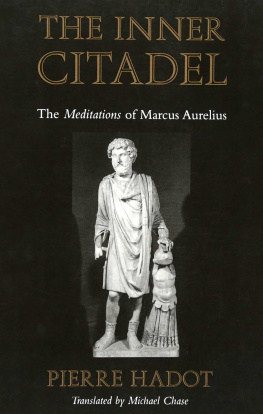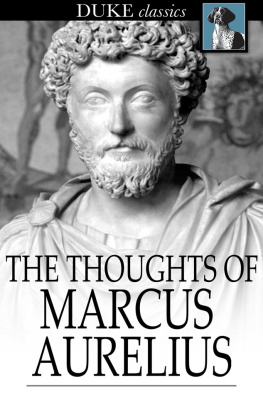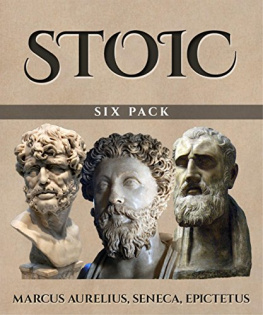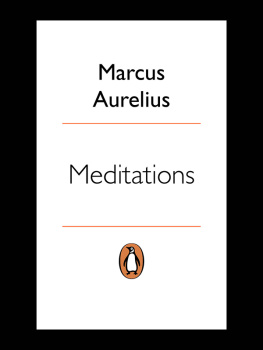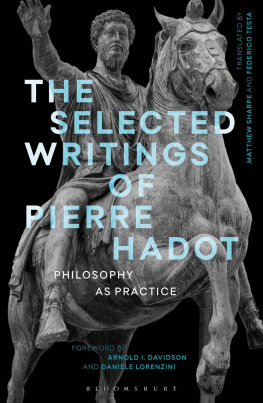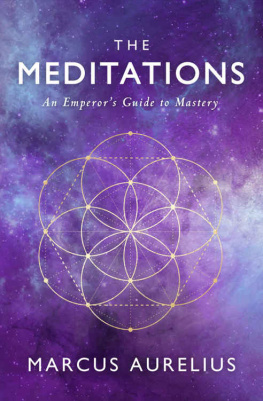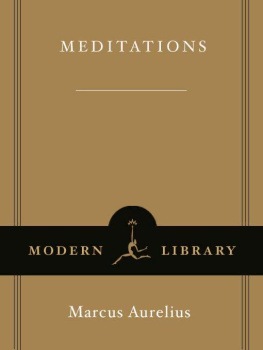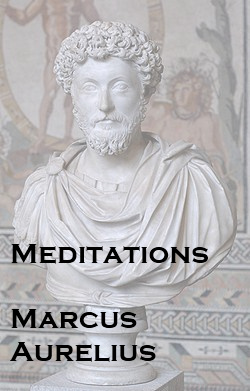The Inner Citadel
The Meditations of Marcus Aurelius
PIERRE HADOT
THE INNER CITADEL
The Meditations of Marcus Aurelius
Pierre Hadot
Translated by Michael Chase
HARVARD UNIVERSITY PRESS
Cambridge, Massachusetts
London, England
1998
Copyright 1998 by the President and Fellows of Harvard College
Printed in the United States of America
All rights reserved
Publication of this book has been aided by a grant from the French Ministry of Culture.
Originally published as La Citadelle Intrieure: Introduction aux Penses de Marc Aurle by Pierre Hadot, copyright 1992 Librairie Arthme Fayard.
Library of Congress Cataloging-in-Publication Data
Hadot, Pierre.
[Citadelle intrieure. English]
The inner citadel: the Meditations of Marcus Aurelius / Pierre
Hadot; translated by Michael Chase.
p.cm.
Includes bibliographical references (p. ) and index.
ISBN 0-674-46171-1 (alk. paper)
1. Marcus Aurelius, Emperor of Rome, 121180. Meditations.
2. Ethics.3. Stoics.4. Life.I. Title.
B583.H33131998
188dc21
97-46971
CONTENTS

PREFACE

Soon, you will have forgotten everything.
Soon, everybody will have forgotten you!
Meditations, VII, 21
Marcus Aurelius was wrong. Eighteen centuriesalmost two millenniahave passed, and the Meditations are still alive. Nor have their pages been reserved to a few aristocrats of the intellect, like Shaftesbury, Frederick II, or Goethe: on the contrary, for centuries they have brought reasons to live to innumerable unknown people, who have been able to read them in the multiple translations of the Meditations which have been made in every corner of the earth; and they still do so today.
The Meditations are an inexhaustible source of wisdom; an eternal Gospel, in Renans words. Apparently, the Meditations do not hold any particular difficulties in store for their readers. Aphorisms and brief dissertations follow one another without any apparent order, and as the reader leafs through the book, he or she winds up finding a striking or moving formula which seems to speak by itself, and to need no exegesis. It is not a book to be read in one sitting. One must return to it often, in order to discover in it, day by day, some nourishment which suits the momentary states of our soul. The modern reader can perfectly well understand a given aphorism by Marcus Aurelius, like the one I have quoted as an epigraph. This is what is always attractive about the Meditations: their sayings, whose limpidity can never grow old.
And yet, what a deceptive limpidity! For besides these formulas, there are others which are much more obscure, and which have been understood by historians in widely varying ways. The overall meaning of the book, its purpose, and some of its affirmations are very hard for us to grasp. Nor is this the case only with Marcus Aurelius. For all kinds of reasons, of which chronological distance is not the most important, our understanding of ancient works has grown more and more dim. To gain access to them once more, we will have to practice a kind of spiritual exercise or intellectual ascetics, in order to free ourselves from certain prejudices and rediscover what is, for us, almost another way of thinking. This is what we shall attempt to do throughout the present work. Before we set out upon this itinerary, however, it may be helpful to become aware of these prejudices and illusions, which threaten to cause the modern reader to go astray when reading a work from antiquity.
In the first place, the reader will perhaps imagine that the text has remained constant since the distant era in which it appeared, as do our contemporary printed texts. But we must not forget that ancient texts were, precisely, not printed: for centuries they were copied by hand, and copying errors were thereby constantly introduced. We can hardly blame the ancient scribes for this, if we think of our modern books, which, although they are printed, are often filled with printers errors, which sometimes deform the authors thought to the point of rendering it unintelligible. That, however, is another question. It cannot be overemphasized that it is thanks to the efforts of the scholars who investigate and classify the manuscripts in which ancient works have been preserved, and who attempt, using the critical method of the classification of errors, to reconstitute the original state of the text, that we can now read the works of antiquity in a state which is more or less satisfactory, but can never be perfect. I feel I must insist upon this point, which is sometimes completely ignored by some scientific authorities or historians of philosophy, who imagine that one can hold forth about the theories of a particular ancient author without knowing what he really wrote. In the case of Marcus Aurelius, the greatest uncertainty often reigns with regard to certain words of his text. This does not affect the totality of the work, but it nevertheless remains true that some passages present almost insurmountable difficulties, and we should not be surprised if these difficulties are reflected in the translations which have been made of this author.
The modern reader tends too often to imagine that there is only one possible translation of a Greek text, and he or she may be surprised to find considerable differences. This fact should, however, make the reader aware of the distance that separates us from the ancients. Translation presupposes, first of all, a choice with regard to the Greek text, in those cases in which this text is sometimes uncertain. But the translators hesitations often also correspond to the difficulties they have in understanding the text, and to the sometimes radically different interpretations of it which they propose. In the case of Marcus Aurelius, for example, many have not been able to render in an exact manner the technical terms, peculiar to the Stoic system, which are found on every page of the Meditations. Moreover, in the case of Marcus, the division of the text into chapters is very uncertain, and often the limits of each meditation are not absolutely clear. Thus, the very appearance of the text can vary widely.
Finally, the modern reader might imagineand no one is safe from this errorthat the ancient author lives in the same intellectual world as he does. The reader will treat the authors affirmations exactly as if they came from a contemporary author, and will therefore think he has immediately understood what the author meant. In fact, however, this understanding will be anachronistic, and the reader will often run the risk of committing serious mistranslations. To be sure, it is fashionable nowadays to affirm that, in any case, we cannot know exactly what an author meant, and that, moreover, this does not matter at all, for we can give the works any meaning we please. For my part, and without entering into this debate, I would say that before we discover unintentional meanings, it seems to me both possible and necessary to discover the meaning which the author intended. It is absolutely indispensable to go in the direction of a basic meaning, to which we can then refer in order to uncover, if we should so wish, those meanings of which the author was perhaps not conscious. It is true, however, that this reconstitution is extremely difficult for us, because we project attitudes and intentions proper to our era into the past. In order to understand ancient works, we must relocate them within their context, in the widest sense of the term, which can signify the material, social, and political situation as well as the political and rhetorical universe of thought. In particular, we must recall that the mechanisms of literary composition were very different then from what they are now. In antiquity, the rules of discourse were rigorously codified. In order to say what he wanted to say, an author had to say it in a specific way, in accordance with traditional models, and according to rules prescribed by rhetoric or philosophy. Marcus Aurelius
Next page
